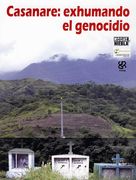
Cover to recent report. COS-PACC will also publish the book «Por dentro e’soga» —a saying from Casanare— concerning human rights violations committed in Casanare under the influence of British Petroleum.
The Social Corporation for Community Advisory and Training Services (COS-PACC)1 is a social organisation which —as part of its human rights defence work— researches the oil multinational British Petroleum’s responsibility in social, economic, cultural and environmental impact in the department of Casanare. COS-PACC participated in the publication of the report «Casanare: exhumando el genocidio»2, published on 31 October 2009. The following is a summary of the report.
British Petroleum arrives in Casanare
BP came to Colombia in the 1920s, but only since 1986 did it establish a significant presence through the acquisition of land along the foothills of the Eastern Andean Range. According to the report, BP provided for and sponsored the presence of foreign mercenaries that supported -and support- extraction operations. The report also stresses that BP contracted Colombian security forces to protect its enterprise. The Colombian army, through the 18th Brigade, continues to receive aid from British Petroleum. In addition to these formal contracts, the company also gives a monthly bonus from between 700,000 to 800,000 Colombian pesos to the brigade’s commissioned and non-commissioned officers for their role in the protection of oil infrastructure3.
The report highlights that the region is characterised by a high degree of militarisation. The 18th Brigade also receives significant US economic aid, which presumably is conditioned to human rights standards. However, in reality, the most violent period in the region began in the 1990s -and continues up to now- with surveillance, stigmatisation and murder carried out by paramilitary groups against organised peasant farmer populations and members of Community Action Boards. Forced disappearances have become a common practice of these groups.
The impact of oil exploitation
In the 1990s, BP’s oil exploitation very quickly turned these plains, which had been a remote agrarian expanse, into the principal area for oil production in Colombia. Foreigners and citizens from other regions of Colombia came to benefit from the oil wealth, which created a radical transformation of the region’s social and cultural conditions. The small-scale farmer was turned into a labourer for the oil industry, diminishing the possibilities of workers and their families for creating conditions to guarantee food security and sovereignty4.
According to the report, the appropriation of natural resources has also generated diverse negative environmental impacts, including the destruction of water resources, changes to the ecosystem from the burning of gas, soil damage caused by exploration and the construction of unplanned roads.
Many cruel methods have been used to persecute persons representing social movements in the region. One of the most significant damages caused in the department has been the persecution and extermination of social movements. The report provides a timeline of this aggression and includes cases of forced disappearances, forced displacement, acts of physical and psychological torture, kidnapping, arbitrary detention and selective murders committed since 1987..
::
1 PBI signed an accompaniment agreement with the Social Corporation for Advice and Community Training (COS-PACC) in August 2009.
2 «Casanare: exhumando el genocidio», Centre for Research and Popular Education (CINEP), Noche y Niebla, and COS-PACC, 31 October 2009. COS-PACC gathered the cases in collaboration with CINEP. The publication is part of the «Victims and Rights» campaign, which was proposed by diverse social and human rights organisations.
